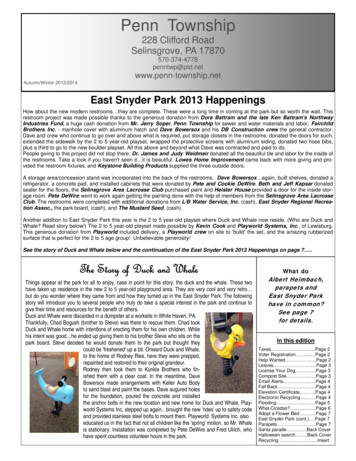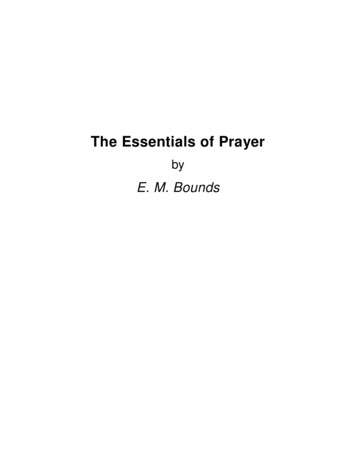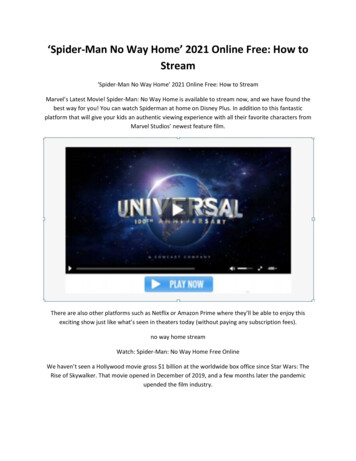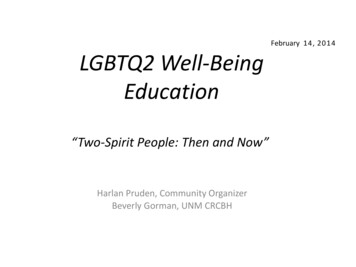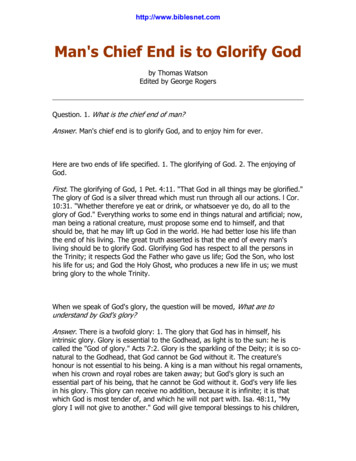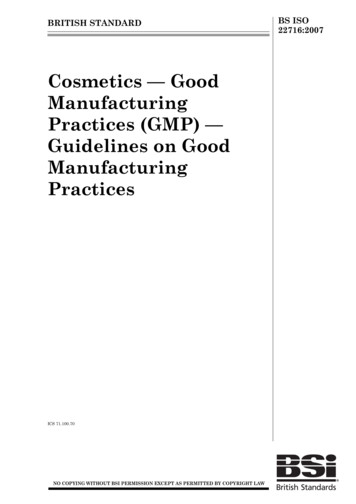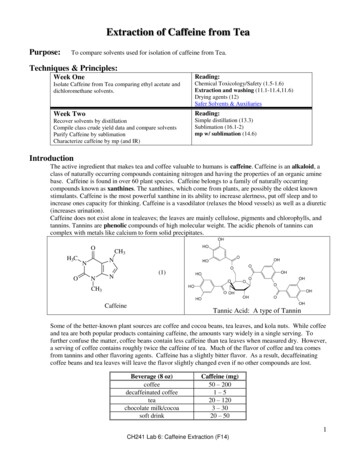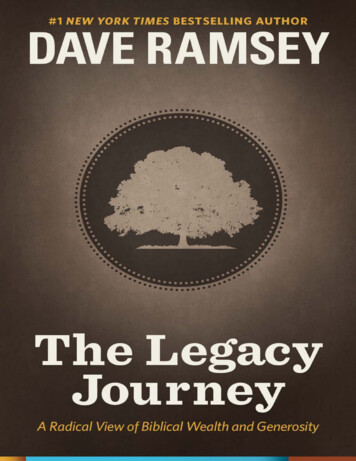
Transcription
“A good man leaves an inheritance . . .”PROVERBS 13:22
DAVE RAMSEY
2014 Lampo Licensing, LLCPublished by Ramsey Press, The Lampo Group, Inc.Brentwood, Tennessee 37027All rights reserved. No portion of this book may be reproduced, stored in a retrieval system, ortransmitted in any form or by any means—electronic, mechanical, photocopy, recording, scanning, orother—except for brief quotations in critical reviews or articles, without the prior written permissionof the publisher.Dave Ramsey, The Dave Ramsey Show, Financial Peace, Financial Peace University, The LegacyJourney, Rachel Cruze, and The Total Money Makeover and are all registered trademarks of LampoLicensing, LLC. All rights reserved.This publication is designed to provide accurate and authoritative information with regard to thesubject matter covered. It is sold with the understanding that the publisher is not engaged inrendering financial, accounting, or other professional advice. If financial advice or other expertassistance is required, the services of a competent professional should be sought.Unless otherwise noted, Scripture quotations marked nkjv are taken from the New King JamesVersion . Copyright 1982 by Thomas Nelson. Used by permission. All rights reserved.Scripture quotations marked nasb are taken from the New American Standard Bible , Copyright 1960, 1962, 1963, 1968, 1971, 1972, 1973, 1975, 1977, 1995 by The Lockman Foundation. Used bypermission.Scripture quotations marked niv are taken from the Holy Bible, New International Version , NIV .Copyright 1973, 1978, 1984, 2011 by Biblica, Inc. Used by permission of Zondervan. All rightsreserved worldwide.Scripture quotations marked tlb are taken from The Living Bible copyright 1971. Used bypermission of Tyndale House Publishers, Inc., Carol Stream, Illinois 60188. All rights reserved.ISBN (ePub) 978-1-937077-74-7ISBN (Kindle) 978-1-937077-72-3Editors: Allen Harris, Jennifer GingerichCover Design: Melissa McKenney
DedicationTo the wonderful Christians I have met around the world who take onthe task of managing wealth for the good of God’s kingdom. These wealthymen and women follow Christ and serve Him and His kingdom, but theyseldom get accolades. On the contrary, they are often the target of hate,criticism, jealousy, and envy. They do most of their investing in God’skingdom without the media or the general public ever knowing their levels ofgiving. They are kind, compassionate, smart, and full of integrity. There arethousands of you, and I for one salute you and thank you for your example.I’m a more generous man—a better man—for knowing you.
AcknowledgmentsThis book is the result of years of thought, prayer, and study—and a lotof conversations. Special thanks to those who walked with me on this journeyand helped make this book possible:Sharon Ramsey, my ever-encouraging wife, girlfriend, and confidant.Allen Harris, my editor, for helping me get this book out of my head andonto the page.Preston Cannon, for coordinating and leading this project.Jen Gingerich, for providing outstanding editorial and project managementsupport.Bob Bunn, for weeks’ worth of faithful Bible scholarship and research.Luke LeFevre, Brad Dennison, and Melissa McKenney, for overseeing alldesign elements and cover art.Debbie LoCurto, Jen Sievertsen, Brent Spicer, Brian Williams, and RobbiePoe, for helping talk through early versions of this material.Mike Glenn and Michael Easley, for their pastoral encouragement andcareful review of early drafts of this book.
ContentsDedicationAcknowledgmentsCHAPTER ONEThe Problem with God’s Ways of Handling MoneyCHAPTER TWOThe War on SuccessCHAPTER THREESnares and DaresCHAPTER FOURThe Law of Great GainCHAPTER FIVEYour Work MattersCHAPTER SIXSafeguarding Your LegacyCHAPTER SEVENGenerational LegacyCHAPTER EIGHTCalled to GenerosityCHAPTER NINE
A Legacy Worth LeavingThe Pinnacle PointThe Road to AwesomeNotesPraise for This Book
CHAPTER ONE
The Problem with God’s Ways ofHandling MoneyThe light was so blinding, I had to squint to see anything at all. It was abright, sunny day, and the detailers had washed, waxed, and polished untilthe whole car was gleaming. The day before, an ugly, mostly unreliable junkersat in that same parking spot, but now it was gone. For the first time in tenyears, I had a nice car again.The past decade had been hard. By age twenty-six, I had become amillionaire. By age twenty-eight, I was bankrupt. I spent several years afterthat learning everything I could about how to handle money God’s ways. Ididn’t just want to rebuild my former wealth; I wanted to honor God withthat wealth. I had finally figured out that I was just a manager and God wasthe Owner, and I wanted a second chance at success. He had trusted me witha lot early on, and I had failed. I had shown Him—and myself—that I wasn’ta good manager. But now things were different. I was passionate about doingthings the right way the second time around. My wife, Sharon, and I vowedafter bankruptcy to never borrow another dime. We worked like crazy to getout of debt and clear of the bankruptcy. We pinched pennies, cut coupons,and skipped vacations. I worked eighty hours a week while she was hometaking care of three little kids. We clawed our way out of the mess usingbiblical principles for handling money, and God blessed us. Our new businessbegan to grow. Life got a little better. We were able to breathe a little easier.And bit by bit we were building wealth again—but you wouldn’t have knownit by my old car.During those years, I drove the cheapest cars I could. We had moreimportant things to do than buy nice cars, and honestly, I had gotten used to
driving junkers. Then one day, I was driving myself and one of my company’svice presidents to an event where I was supposed to speak, and the latest inmy proud line of cheap cars broke down. There we were, standing in theparking lot of a gas station with steam pouring out from under the hood ofthe car. We looked through the trash, found an empty jug, and used it topour water into the radiator to cool down the car so we could get to the event.By that time, my net worth was well over 1 million again, so this wholescene was ridiculous. My VP chided me, saying, “You seriously have to get abetter car. This is crazy! You have the money!” And he was right. Themoment had arrived. I was way overdue for a nicer car.I shopped all over for a great buy, and I finally found a great deal on atwo-year-old Jaguar. That was kind of cool because I drove a Jag right beforeI went broke. It felt like God was saying He was restoring what the locustshad eaten.1 So there I stood in the parking lot of my office just looking at it.You’d think everything about that moment would have been perfect, right? Imean, I had done everything right this time. We had zero debt. I owned thatcar free and clear, and it was a perfectly reasonable purchase for my family. Ina way, it represented a new way of life because it was a physical symbol thatGod’s ways work—that I could build wealth again the right way. But as Istood there, I wasn’t thinking of any of that. Instead, I suddenly questionedmy decision. With the sunlight shining off this beautiful car, the onlyquestion that came to mind was, Did I do something wrong?I started thinking about all the hungry children in the world, and Iwondered what they’d think of my new car. How many kids could I have fedwith the check I had just written? Then I started to worry about what myfriends and customers and clients would say. Would they think I was a phonybecause I talked so much about generosity but I decided to spend this moneyon something nice for myself? Standing in the parking lot that day, I realizedsomething. God had been teaching me about money for the past ten years, butnow it was time for Him to teach me about wealth. Now, in The LegacyJourney, I want to share with you what I’ve learned.
But let’s be clear right up front. I’ll go ahead and ruin the end of thestory for you. I didn’t do anything wrong by buying that car. I think Godsmiled at me as I wrote that check. Depending on who you listen to or whatyou read about wealth, that may shock you. If so, then get ready to beshocked a lot in this book. It’s time to see what God’s Word really says aboutwealth. And trust me: It’s a much different message than you’re hearing inour culture today.
THE STORY SO FARYou probably know my story. I’ve told it a zillion times on the radio, inbooks, and in my nine-week class, Financial Peace University (FPU). I haterepeating my story for those who already know it, but let me give you theshort version just so you know where I’m coming from. I started out withnothing and became a millionaire by the time I was twenty-six. But my entirenet worth was supported by a huge pile of debt. One bank called one loanearly, and that started a domino effect of me losing everything I owned overthe course of two and a half years. Then, with a toddler, a new baby, and amarriage hanging on by a thread, Sharon and I threw up the white flag anddeclared bankruptcy.
Wake Up!As we went through those hard times of losing everything, God startedshowing us the basic principles for how to handle money in His Word: Getout of debt. Live on a budget. Live on less than you make. Save. Invest.Never cosign. Always get the counsel of your spouse. I discovered thesefundamental tenets—the core things you do to win with money—straight outof Scripture. But because I was a young hotshot with all these letters andlicenses after my name that said I’m supposed to know something aboutmoney, all of this was new to me and kind of jolted my system. God had usedmy financial crash to say to me, “Wake up, stupid! You’re going the wrongway! What you’re doing isn’t in line with Scripture. It isn’t even in line withcommon sense!”I’ve talked with tens of thousands of families who have gone throughFPU who have had the same experience. When they learned these principlesfor the first time, it felt like God was grabbing them by the shoulders andsaying, “Wake up!” That’s what FPU and my books Financial Peace and TheTotal Money Makeover have been about. Their purpose is to get you to thatwake-up, then moment—that point where God gets your attention and youstart to turn your financial life around.So if Financial Peace and The Total Money Makeover are about wakingup, The Legacy Journey is about growing up. At some point we all have tomove beyond just drinking milk and learn to eat solid food. We must maturein our view of wealth. That means we have to emotionally and spirituallygrasp wealth as a concept through the lens of Scripture. As we do that, ourperspective changes. We really start to take hold of our role as managers—stewards—of the resources God has placed in our hands. What you do withHis resources is what your legacy is all about.
What’s the Problem?Here’s the problem: God’s ways of handling money actually work. If youdo the things I teach from God’s Word, if you are diligent and wise with yourincome, then over time you will become wealthy. No matter who you are orwhere you’re starting from, you will at some point become one of those “richpeople.” I’ve seen it more times than I can count.I was doing a book signing a while back and saw a guy in coverallsstanding at the end of the line. Where I’m from, coveralls mean you do realwork. You do the kind of work that’s hard and dirty, so you put on thecoveralls to keep your real clothes from getting ruined. This man waitedpatiently, but I could tell he was the kind of guy who didn’t really like tostand around waiting. He had a head full of bushy gray hair and a matchinggray beard. He looked tired too; it was easy to tell that he’d been on his feetall day. When he finally got to the book-signing table, I noticed that hedidn’t have a book in his hand. He was just holding a little scrap of paper.He said, “Dave, I’m not here to buy your book.” I thought, Well, whywould you want to stand in line for an hour just to tell me you didn’t want to buymy book? He continued, “I just want to tell you that I started listening to youon the radio ten years ago. I heard all those things you said about theScriptures and I went and looked them up for myself, and I started living thatway. And I gotta tell you, the stuff you teach on the radio works.” Then heput that scrap of paper down on the table in front of me. There were twonumbers written on it: - 66,283 and 847,623. I looked back up at him andsaw this strong, burly workman with big tears in his eyes. He said, “The firstnumber is where I started thirteen years ago, and the second number is whereI am now. I started with a negative net worth and 66,283 in debt, and todayI am debt-free with 847,623 in mutual funds. This stuff works, Dave.”That conversation meant so much to me that I kept that little scrap ofpaper. If you were to come visit me in my office, you’d see it in a frame on mybookshelf. I love it because it doesn’t just represent a financial turnaround; it
represents a total change of direction for an entire family. This guy’s familygoing back several generations had never seen that much money before, butthere it was. And because he taught his kids how to handle money, it wouldbe there for them. And as it grew over time and his kids added to it, it wouldbe there for his grandkids. This one man applying God’s ways of handlingmoney—even with a modest income—had completely changed his familylegacy. And that’s the “problem” with handling money God’s ways: You endup wealthy. So let’s talk about that.
THE LEGACY JOURNEY FRAMEWORKIn my classes and other books, I explain in detail what I call the BabySteps. This is the process for taking control of your money, getting out ofdebt, and starting your family on the road to financial security and long-termwealth building. I’m not going to reteach all of that here, but I will take just asecond to review the seven Baby Steps:Baby Step 1: Place 1,000 in a beginner emergency fund( 500 if your income is under 20,000 per year).Baby Step 2: Pay off all debt except your home mortgageusing the debt snowball.Baby Step 3: Put three to six months of expenses intosavings as a full emergency fund.Baby Step 4: Invest 15 percent of your household incomeinto Roth IRAs and pretax retirement plans.Baby Step 5: Start college funding for your kids.Baby Step 6: Pay off your home early.Baby Step 7: Build wealth and give.The first three Baby Steps are all about taking control of your money. Inthose steps, you’re correcting bad behaviors, getting out of debt, putting somemoney in the bank, and basically cleaning up a mess. Those months or yearscan be tense, but they are crucial to changing your legacy. Once you hit BabyStep 4, though, you start to feel a different kind of tension. For maybe thefirst time, you’re able to relax a little bit, take a breath, and realize that you’re
in a position to build wealth. And that’s when you start facing the questionsthat popped into my head that day as I was looking at my new car. For this,there’s a different process in place that works alongside the Baby Steps. I callit NOW–THEN–US–THEM, and it’s the framework for your legacyjourney.
NOW: Taking ControlWhen you first have that wake-up moment and start doing a budget andworking through the Baby Steps, you are laser-focused on taking control ofyour money and cleaning up a financial mess. I call that stage the NOW. Atthat stage, you may be broke, behind on your bills, struggling to put food onthe table, and always worried about making one paycheck last until the nextone arrives. Picture it for a moment: You are at the kitchen table with yourhead down, slumped over a pile of bills. You can’t look up, because there areabout a dozen different crises right under your nose. All you’re trying to do istake care of all the little fires going on right now. That’s not a fun place to be,but that’s where a lot of us start.In the NOW, your job, first and foremost, is to take care of your family.The Bible says, “If anyone does not provide for his own, and especially forthose of his household, he has denied the faith and is worse than anunbeliever” (1 Timothy 5:8). At this stage, if you are a believer, you should betithing (giving a tenth of your income) to your church, but now is not thetime to give extra beyond that. And you shouldn’t feel guilty about thateither, because you are obeying your biblical mandate to take care of yourfamily. This is also not the time to invest or fund the kids’ college accounts.The long-term plan is to completely change your family’s legacy, but thatmay seem like a tiny dot on the horizon at this stage. In the NOW, the goalis to stop the bleeding and get your feet under you.
THEN: Getting a Future FocusGetting through NOW may seem like an eternity because you areworking so hard and feeling completely stressed out, but over time, you startto take control of things. As you keep moving through the Baby Steps, youstart to relax and are able to breathe again. Finally, you start to get a littlewiggle room. If you’ve already been through the NOW, you know exactlywhat I’m talking about. You might even remember a specific moment whenyou realized that things were changing. That’s a great place to be because assoon as the pressure eases, you are able to lift your head up a bit. When thathappens, you can take your eyes off the NOW and start focusing on theTHEN.The THEN stage challenges you to adopt a future focus. By this point,you should be at Baby Step 4, investing 15 percent of your income intoretirement, and Baby Step 5, funding your kids’ college accounts. You caneven start attacking the mortgage to pay off the house early, which is BabyStep 6. That’s a much different place mentally, spiritually, and emotionallythan the NOW, isn’t it? With NOW, you’re just trying to make it throughthe end of the week, but in THEN, you’re able to look out at the futureyou’re working so hard to create for your family. Scripture says, “Where thereis no vision, the people perish” (Proverbs 29:18 KJV). At this stage, you’regetting a vision for where you’re going, which is crucial to your long-termsuccess.
US: Creating a Family LegacyWhile you’re working on NOW and THEN, you often have tunnelvision because you’re so focused on getting your own finances and futureunder control. But once you start building some wealth in your mutual fundsand 401(k), and as you get closer to finally paying off the mortgage, you startto realize that you really are going to retire with dignity. You’re not ready toretire yet, but that tiny dot on the horizon has gotten bigger. It’s coming intofocus, and it doesn’t feel like a daydream anymore. This is going to happen,and you’re going to be fine.Just breathe that in for a second. Imagine your family—your kids, yourgrandkids, and maybe even your future great-grandkids—taken care of forgenerations to come. I call this stage US because it’s not just about you andyour spouse anymore. The Bible says, “A good man leaves an inheritance tohis children’s children” (Proverbs 13:22). This isn’t about getting out of amess; this is about changing your family tree.In the US stage, you’re talking to your kids about money and makingsure they have the emotional and spiritual maturity to manage the wealth youmight leave them someday. You’re also teaching them to build wealththemselves. And more than anything, you’re making sure they’re notconfused about God’s ownership and their role as manager of what He’sprovided. If you’re not intentional about growing your kids’ characters andability to handle money, you can work your whole life to build wealth only tohave it end up ruining them. As you work through US, you’re making surethat will never happen.
THEM: Leaving a Legacy for OthersAs you get to the end of the legacy journey framework, you know thatthe bills are paid—that’s NOW. You know that you’re going to be able toretire with dignity and send your kids to college—that’s THEN. You knowthat you are taking steps to prepare the next generation to carry your newfamily legacy forward—that’s US. And then, finally, you see the big picture—the THEM.The THEM stage represents all the needs in your community andaround the world, and you begin to see how God can use you to meet someof those needs. Your vision expands and you start to see the world throughChrist’s eyes. Suddenly you see wells that need to be drilled in Haiti. You seethe HIV prevention efforts in Africa. You see mosquito nets that can be usedto prevent malaria. You see the hungry children right down the street. Yousee the broke, scared single mom at the other end of the pew who can’t paythe light bill this week—and who might need a reliable car too. At this stage,you’re able to open your eyes and see—maybe for the first time—how you canmake a difference in the world.Proverbs says, “He who gives to the poor will not lack, but he who hideshis eyes will have many curses” (28:27). I don’t think most of us ever actuallyhide our eyes; I just think the pressures we’re under keep our heads down sowe can’t see. But as we work through these biblical principles about takingcare of our family first, casting a vision for the future, and leaving aninheritance to our children’s children, we’re able to lift our heads and lookclearly into the future. God can do amazing things through us in that future.But we have to take it one step at a time, first through NOW, then THEN,then US, and finally to THEM. And that’s where we get to help change theworld. That’s a powerful legacy.
YOU ARE HERENo matter where you are in the Baby Steps, The Legacy Journey will giveyou a clear, biblical view of wealth and generosity. You may not be financiallyready to change the world today, but you need to see where God might takeyou one day. If you are just getting started, meaning you aren’t living on abudget, you have some debt (including cars and student loans), and you havenothing in savings, then you really need to get those things under control.Use Financial Peace University or The Total Money Makeover to get startedimmediately. It’s never too early—or too late! That’s the foundation foreverything in this book, and those are the resources and tools that will get youthrough NOW and THEN.Most of all, at this point I want you to grasp that if you are diligent inhandling God’s money God’s ways, you will walk through these steps ofbuilding wealth. So don’t be surprised when, as you move out of debt, learnto live on less than you make, give, and save, you become wealthy. If you arediligent with the steps, your eyes will look up from the NOW. You will beginto look toward the future with the THEN. You will become concerned thatthe next generations of your family are set up in the US stage. And of course,once that is done, it will feel natural and easy to meet the needs that God setsbefore you in the THEM. This is a biblical process, so you are not doinganything wrong by first taking care of your family, then your future, thenfuture generations of your family, then finally to be outrageously generouswith the wealth that God has allowed you to manage for His glory. So if theworld or toxic “Christian” voices are trying to send you on a guilt trip, takeheart that you are walking through a biblical process.The Legacy Journey is primarily designed for those of us in the later BabySteps—Baby Step 4 and beyond—who are working on US and THEM.
We’re going to talk a lot about wealth as a concept, and we’re going toaddress a lot of the toxic messages in our culture that tell us we should beashamed of the success God’s given us. We’ll talk about how to figure outhow much is “enough” for your family, and we’ll identify key things thatshould be part of your estate plan. We’ll talk about how to keep money fromruining your relationships and your kids. And of course, we’ll talk about thatincredible day when your hard work and faithfulness have paid off, whenyou’ve paid the price to win, when you’ve lived like no one else, and you’refinally ready to live—and give—like no one else. This is going to be a wildride, and it’s not just going to change your life. It’s not just going to changeyour family tree. It’s going to show you how to live and leave a lasting legacyof excellence.
CHAPTER TWO
The War on SuccessA couple of years ago, I had an unbelievable opportunity to spend timewith a group of ten incredibly successful, insanely wealthy business leaders.These were rich folks—really, really rich. The minimum net worthrepresented in the room was half a billion dollars. They were all totallycommitted, sold-out Christians. In fact, these guys were meeting to discussthe different ways their families had given to kingdom work in the past year.It was kind of a counsel of Christian philanthropists, and they met to discussdifferent giving opportunities and to encourage each other. When they addedit all up, these ten families had given more than 1 billion to differentministries and mission work in just that one year alone. And there I was,sitting in the middle of it. Talk about feeling like a wiener in a steakhouse!After a day of hearing these amazing stories of radical generosity, themeeting wrapped and the group headed out to dinner. The guy who calledthe meeting—the wealthiest man in the room—said, “Hey Dave, would youride with me?” Now this guy is worth 2.2 billion. He’s a business genius, agreat Christian man, a great husband and father, and exactly the kind ofperson I like hanging out with. I want to learn from these kind of peoplebecause I want to grow up to be one! So when he asked me to ride with him,I was in. “Oh, you bet. I’ll ride with you. You drive, and I’ll take notes thewhole time. Let’s go.”As we were walking out, he said, “Listen, before we get out there, I wantto apologize for my car.” Honestly, it caught me off guard. He didn’t reallystrike me as the kind of guy who’d roll up to a meeting of billionaires drivinga junker. I said, “Why apologize? Are you driving a beater? We can take mycar if there’s something wrong with yours.”He said, “No, it’s not that. I actually just bought a new car. In fact, it’s
the nicest car I’ve ever owned.”I had an idea of what was going on, because, like I said in the previouschapter, I had been there myself. But I asked anyway, “Why would you beashamed of that?”He hung his head a little bit and replied, “Well, it’s a really nice car.”About that time, we walked up to his parking spot. He wasn’t kidding. I waslooking at a brand new Mercedes. I looked the thing up when I got homethat night. It was a 130,000 car. It was sweet. But instead of being excitedabout it, he felt like he had to apologize for it.Let me tell you a little about this guy. He’s worth 2.2 billion. That yearalone, he had personally given away around 500 million to Christianministries and Christian work around the world. But, of course, you’d neverhear about that in the news or a press release because he didn’t do it for you.He doesn’t care what you think. He did it because he’s a passionate giver, notbecause he wants to impress anyone or make headlines. So that year, aftergiving away 500 million to kingdom work, he bought himself a nice 130,000 car.Guess what happened? He started getting hate mail—from Christians.Now, I think “Christian hate mail” should be an oxymoron, but I’ve gottenenough of it myself to know that it’s real. He got notes and emails telling himhow wasteful and selfish he was. They said things like, “You should have usedthat money to drill more wells in Africa” or “I wonder how many starvingchildren you could have saved with that 130,000.” These strangers—none ofwhom, I’m sure, had ever seen 1 million, let alone 2.2 billion—crawled outof the woodwork to condemn his decision and question his faith just becausehe bought himself a nice car.I have to be honest: That bugs me. It bothers me because I know thisguy. I know his heart. He’s a strong believer. He’s a follower of Christ. He’sapplied God’s ways of handling money, he’s faithfully provided tremendousvalue to his customers, he’s given hundreds of millions of dollars to others,and he has been richly blessed by God. To see him criticized for enjoying theblessings God’s given him hurts me, but it’s something I’m seeing more and
more of in today’s culture. There’s a war on success happening in Americatoday, and it’s something we as believers need to talk about.
THE ROOT OF ALL EVIL?Money is not the root of all evil. Let me say that again: Money is not theroot of all evil. The Bible does not say that, no matter how often you’ve heardit. It’s one of those things that people are sure is in Scripture, but they’rewrong. It’s like the saying “God helps those who help themselves.” A recentstudy found that 82 percent of Americans believe that is pulled straight fromthe Bible!1 It’s not. But wait; it gets worse. Writing for Christianity.com,Albert Mohler went through more findings:A Barna poll indicated that at least 12 percent of adultsbelieve that Joan of Arc was Noah’s wife. Another surveyof graduating high school seniors revealed that over 50percent thought that Sodom and Gomorrah werehusband and wife. A considerable number of respondentsto one poll indicated that the Sermon on the Mount waspreached by Billy Graham. We are in big trouble.2I wonder what the response would have been if this poll had askedpeople if “Money is the root of all evil” is a verse from the Bible. People getall these crazy ideas about what the Bible says, but they never take time toslow down and see what it really says. If you want to truly mature in yourChristian walk, you’ve got to take the time to actually dig into Scripture andsee what’s true and what’s not.
Gnostics in the LandFirst Timothy 6:10 does not say that money is the root of all evil. It says,“For the love of money is a root of all kinds of evil” (emphasis added). It’s notabout money; it’s about our attitude.
Dave Ramsey, The Dave Ramsey Show, Financial Peace, Financial Peace University, The Legacy . Now, in The Legacy Journey, I want to share with you what I’ve learned. But let’s be clear right up front. I’ll go ahead and ruin the end of the story for you. I
